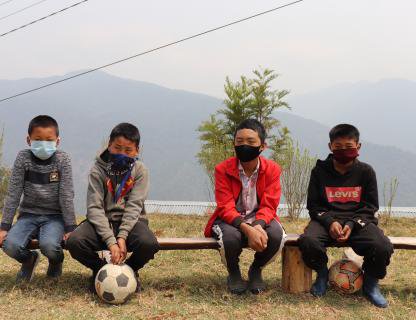
One out of five children between the ages of 2 to 4 years in Nepal is not developing on track amidst the COVID-19 pandemic, new data from UNICEF shows. The pandemic has especially affected the health, learning and psychosocial well-being of the children.
The Early Childhood Development Index (ECDI) survey conducted in August showed that children from lower income families, living in rural areas, with caregivers with no or low levels of education, and not attending early childhood education (ECE) programs were at higher risk of being developmentally off track. Even among children who attended ECE, those who attended government ECE were at higher risk of being developmentally off track compared to those who attended private programs. ECDI survey is a phone-based survey conducted among nationally representative sample of 2,853 households with children to understand the development needs and status of young children aged 2 to 4 years.
Early stimulation activities with care givers like reading books, telling stories, singing songs, going outside, naming objects, counting, or drawing things were found to be important for young children’s development and learning. However, the data alarmingly revealed a plunge in parental engagement compared to pre-pandemic conditions. Under the dynamic situation and especially in the time when people’s lives were affected by loosening of the prohibitory orders in August 2021, only 31 per cent of children received early stimulation at home by family members compared to 73 per cent in 2019. With follow up survey in October, it was found that mothers’ engagement improved over time as they got over the hectic time of returning to the normal from the strict prohibitory order. However, fathers’ engagement remained low (6 per cent), maintaining a frequent social norm of fathers’ reduced involvement in parenting.
Half of the surveyed children were found to be enrolled in pre-primary level. However, during school closure, 34 per cent of children did not engage in learning through alternative learning modalities at all. Most of the children accessed home tuition, while alternative learning modalities specified by the government’s Emergency Action Plan (e.g., online class, mobile teacher, radio, TV, tele-teaching) were underused. Low-tech solutions, such as educational radio and TV and tele-teaching were almost unused. High-tech solutions like online class were used almost exclusively among children who attended private ECE. Underused low-tech solutions and unequal access to high-tech solutions might have contributed to the developmental gap observed between children who attended private ECE and other children. The details of the study can be found here.
Based on the results of the survey and to ensure that all children realize their development potentials and be ready for further learning, UNICEF calls upon government, development partners, teachers, parents and other stakeholders to:
- Target children who are at higher risk of becoming developmentally off track through effective interventions for remedial learning. Special attention needs to be paid to children from lower income families, living in rural areas, with caregivers with no or low levels of education, and not attending ECE or attending government ECE programs.
- Develop systems to support teachers and parents to understand each child’s individual development and learning level through user-friendly assessments and teaching-learning guidelines to enable learning at home and school.
- Utilize the alternative learning modalities specified in the National Emergency Action Plan in times of school closures. Data show the effectiveness of these learning modalities but also reveals that they were underused by the families.
- Strengthen parenting education, with focus on fathers’ engagement, starting from conception phase through multi-sectoral collaboration so that parents and caregivers receive continuous encouragement and guidance to support children’s learning at home.
- Enhance early stimulation activities by parents such as reading child-friendly books, telling stories, singing songs, taking children outside, playing with them, naming objects, counting, or drawing things together.
- EU Ambassador To Nepal Veronique Lorenzo Paid A Courtesy Call On Rana
- Jul 27, 2024
- 139 People Died In The Disaster
- Jul 27, 2024
- Monetary Policy Eases Managing Capital Fund Stress
- Jul 27, 2024
- Weather Forecast: Chances Of Heavy Rainfall Is Likely In One Or Two Places Of Sudu Paschim And Bagmati Province
- Jul 27, 2024
- The Sentiment Of Monetary Policy Seems Focused On Increasing Eemand: FNCCI President Chandra Prasad Dhakal
- Jul 26, 2024
















